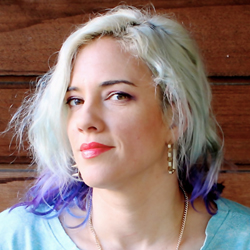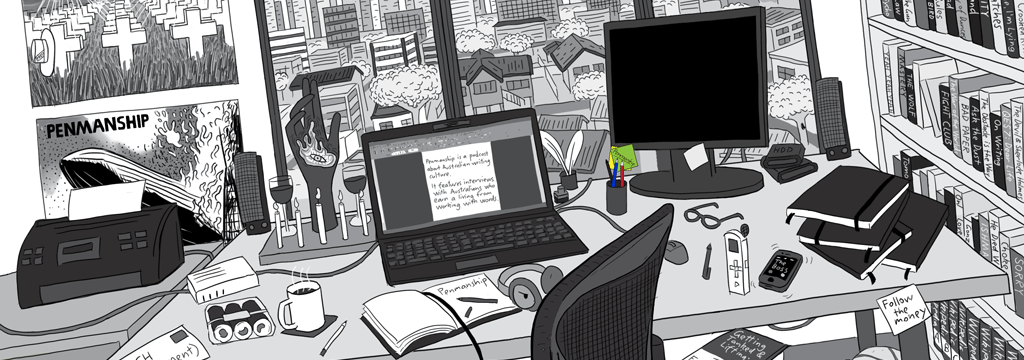Jenny Valentish is an author, freelance journalist and editor.
 In 2014, she published her first novel, Cherry Bomb, a teenage psychodrama set in the music industry. She’s currently working on a book of immersive journalism about addiction to be published in 2017. Before writing books, though, she was better known as an accomplished magazine editor, having moved to Australia from England in the mid 2000s and worked on titles such as Time Out Melbourne and Triple J Magazine. The latter publication is where I first met her, in 2009, when I was a new freelancer and still very much learning about how this business works. As an editor, Jenny was patient, supportive and fun to write for, and we’ve kept in touch since.
In 2014, she published her first novel, Cherry Bomb, a teenage psychodrama set in the music industry. She’s currently working on a book of immersive journalism about addiction to be published in 2017. Before writing books, though, she was better known as an accomplished magazine editor, having moved to Australia from England in the mid 2000s and worked on titles such as Time Out Melbourne and Triple J Magazine. The latter publication is where I first met her, in 2009, when I was a new freelancer and still very much learning about how this business works. As an editor, Jenny was patient, supportive and fun to write for, and we’ve kept in touch since.
With her long history of sitting in the editor’s chair and dealing with the daily deluge of story pitches, she has a finely tuned sense of what editors want from their freelance contributors. We discuss this topic in a conversation that took place in Brisbane in early December, as well as how Jenny’s substance use overlapped with her creativity; how she was misrepresented as a “middle-class super groupie” by an NME journalist at age 18; what that experience taught her about having a duty of care toward the people she writes about; why British editorial staff tend to get preferential treatment in the Australian publishing industry; why she started a blog with the goal of doing something new every day for a year and writing about it, and how her early career writing for porn mags helped her to write graphic sex scenes for Cherry Bomb.
Jenny Valentish has been a music journalist since her teens, when her self-published fanzine got her splashed across the British papers for all the wrong reasons. Her career proper started in London as a music publicist, then took a sharp left into book editing for a crime fiction publisher. Staff positions followed at adult magazines and a guitar title, as well as a much-coveted column in NME. Upon defecting to Australia, she worked as chief sub for ACP’s Ralph, then as editor of Triple J’s Jmag, and finally as editor of Time Out Melbourne (sister mag to London’s Time Out), which she launched. On her daily commute she wrote the novel Cherry Bomb for Allen and Unwin, tagged as ‘a teenage psychodrama set in the music industry’. Since retiring – as she calls ‘going freelance’ – she writes artist bios for record labels and regularly contributes to The Age, The Sydney Morning Herald and The Saturday Paper. She is working on a non-fiction book for Black Inc on women and addiction.
Jenny Valentish on Twitter: @JennyValentish
Direct download | iTunes | Stitcher | Libsyn | YouTube
Timeline:
3.30 Jenny is visiting Brisbane on a research trip for her second book, which is about women and addiction
4.00 Jenny has written about addiction for The Saturday Paper, The Age, The Monthly and The Big Issue: “It’s a topic close to my heart, because I stopped drinking six years ago”
5.30 Jenny is aiming to write the book in six months, but “it’s been brewing for over six years”
6.30 “I think people think of me as a music journalist, but more than music, [addiction] is an area of expertise”
7.00 With this book, Jenny wants to do immersive journalism in the vein of Jon Ronson, Anna Krien and Helen Garner, where the reader comes with the author on the journey
8.30 Jenny will be an unreliable narrator in this book: “I quite like that sense of, ‘Can she even remember what she’s talking about?'”
9.00 How Jenny’s substance use has overlapped with her creativity throughout her career
11.30 The pub always felt like “the perfect writing environment” to Jenny, but now she writes in cafes
12.00 Jenny grew up in Slough, England until she was 18, “which is where The Office was set”
13.30 Jenny used to read her older brother’s Kerrang! magazines when she was 10 years old, which is where her interest in music writing began
14.00 When writing articles for her fanzine, Slapper: The Groupie’s Guide to Gropable Bands, Jenny would get really drunk beforehand, then “blunder through a terrible interview, and write it up verbatim, with all its awkwardness intact, but take the piss as well”
15.00 At age 18, Jenny was “stitched up” by an NME journalist named Steven Wells, who misrepresented her as “a new breed of middle-class super groupie, as if I was spearheading this movement”
18.00 “It was kind of pre-internet, and I’m so happy about that. Because if it happened now, it’d still be out there”
19.00 This experience gave Jenny the impetus to not treat other people like that, and always have a sense of responsibility and a duty of care toward her sources
19.30 Sometimes after interviews, Jenny will follow up to confirm that her sources are happy for particular quotes to be published
21.00 After the experience with Steven Wells, Jenny took a job working for a small crime fiction book publisher
23.00 At university, Jenny studied American Studies, and also spoke with an American accent until the age of 26
25.00 Jenny worked at the crime fiction publisher for about two and a half years, and was eventually trusted to edit the books on her own
26.30 Jenny worked as a sub-editor for porn mags like Club, Razzle and Men Only, writing “the entire magazine, from the editor’s letter to the interviews with girls in the picture stories”
28.30 The letters addressed to the magazines were always written by men in prison
29.00 “It was a ridiculous job. Who reads that?! … I was drinking extremely heavily at the time. It was just the same thing every day”
31.00 Jenny was trying to write another book for the two years she was working at these magazines, but the characters she was writing about were always quite like her
32.30 “The very act of writing things down, for me, turns it into fiction – and then it can’t hurt you any more, so it’s really powerful”
34.00 Jenny worked as a music publicist in 1996, and got fired after six months
36.00 After that, she did a bit of freelance music publicity while working as a cleaner
36.30 Working in music publicity is “setting yourself up for abuse”
37.30 Jenny moved to Sydney in 2002; she was married to an Australian and got a job as chief subeditor at Ralph magazine
39.00 “I was told when I came over that the British get preferential treatment in the Australian publishing industry, mainly because we’ve learnt grammar”
39.30 Jenny worked at Ralph for six months, before being offered the editor’s job at Triple J Magazine (then known as jmag)
41.00 After her first Australian visit, Jenny returned to Slough and worked behind a bar where the boss used to give the staff an ecstasy pill each at the start of the shift “so that they could cope”
42.00 Jenny used to think she drank because she was depressed, “but actually it was more social phobia, and possibly even ADHD”
43.00 “I basically carried a bottle of vodka on me for the next 20 years, and part of the joy of that was people not knowing”
43.30 The editor job at jmag in 2007 saw Jenny move to Melbourne and work for News Custom Publishing
45.00 It was “a bit of an awkward relationship” between News Limited and the ABC, who had final approval over everything that went into jmag
47.30 How Jenny managed and recruited freelance contributors to jmag, and her biggest gripes about dealing with freelancers as an editor
50.00 What happened after somebody at the ABC accidentally leaked the winner of the annual Hottest 100 poll in 2009, Mumford & Sons (‘Little Lion Man’)
51.00 “I saw lots of comments on message boards from triple j haters making sarcastic comments, but no, I didn’t personally cop anything”
52.30 After jmag, Jenny became editor of Time Out Melbourne, which was a “dream job” as she read it as a kid in London
54.00 “It was such a great job, because you could basically interview whoever the hell you wanted, and it’d fit into some section”
54.30 What makes a good interview, according to Jenny
55.30 Jenny’s profile of Brian Wilson was published in The Sydney Morning Herald Spectrum the weekend prior to our interview, and it was based on a 20 minute phone interview with him
56.30 How Jenny goes about structuring feature articles and profiles
58.00 Jenny enjoys transcribing interviews: “There’s definitely a value to it”
59.00 She was editor of Time Out Melbourne for four years, after launching it with a small team
60.30 Jenny started a blog named Hey Man, Now You’re Really Living while editing jmag, where she set herself the goal of doing something new every day for a year and writing about it
62.30 “It would distract me for quite a few hours a day. So I had my job, as well, so it left zero time for standing on my porch, chain-smoking and looking at the horizon, which is what I’d been doing up until that point”
63.30 Why Jenny moved from Melbourne to Castlemaine, which required a 4.5 hour round-trip train commute each day
64.30 With the blog, Jenny wanted to go out with a bang on the last day by blowing something up, but no-one would agree, so she found a schoolgirl who was “a bit of a pyromaniac” to blow up a wheelie bin
67.00 How Jenny began writing her first novel Cherry Bomb while commuting on the train
68.00 “I just wrote the whole thing without a publisher or an agent, and then started pitching it the moment I finished it, which was about 10 months”
69.30 How Jenny went about writing sex scenes for Cherry Bomb, which came easily thanks to her early history in writing for porn mags
70.00 “You need to get straight to the point, and use the language that you’d use in real life. So no ‘throbbing’ anything; it’s just ‘cocks’, and ‘fucks’, and ‘cunts’ and things”
70.30 How Jenny decided to approach Australian musicians for quotes to appear on Cherry Bomb‘s front and back cover: Paul Kelly, Tim Rogers, Adalita and Abbe May
71.30 “I wanted people who were interested in music to read it, and I wanted musicians to endorse it, because that would show that it was true-to-life”
73.30 Cherry Bomb was a one-book contract, and Jenny is not interested in revisiting those characters for a sequel
74.30 How Jenny pitched and signed with Black Inc, who will publisher her second book in 2017
75.30 Jenny briefly worked at Mamamia website The Glow after Time Out Melbourne, but left after three and a half weeks
76.30 Moving from a print publication to an all-digital, daily website was difficult for Jenny; she was working 70 hour weeks
78.00 How Jenny manages her career as a freelance journalist and editor. “I’m on half [as much money] as I was before, possibly less”
79.30 Jenny wrote about wildlife rescue and kangaroo rehabilitation for The Saturday Paper in 2015, and has since become interested in exploring this topic further in her writing

